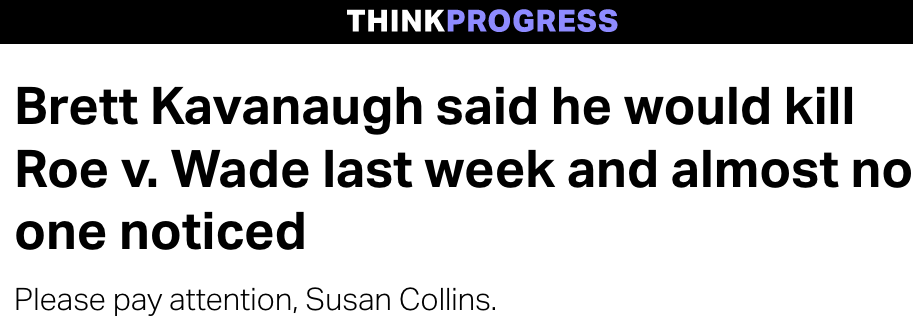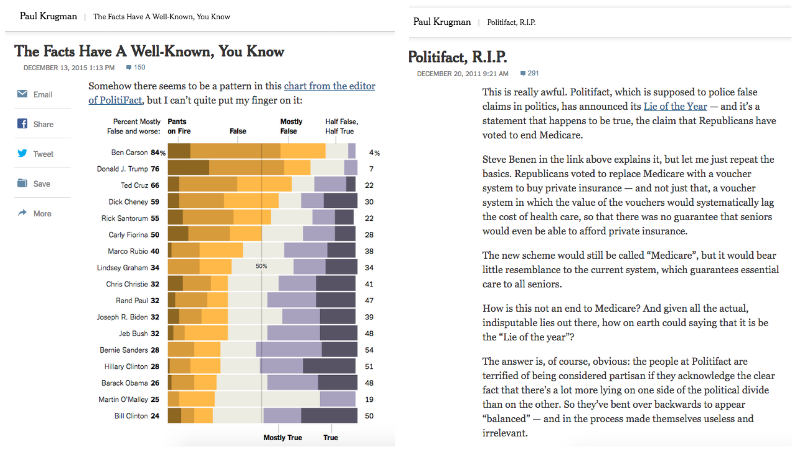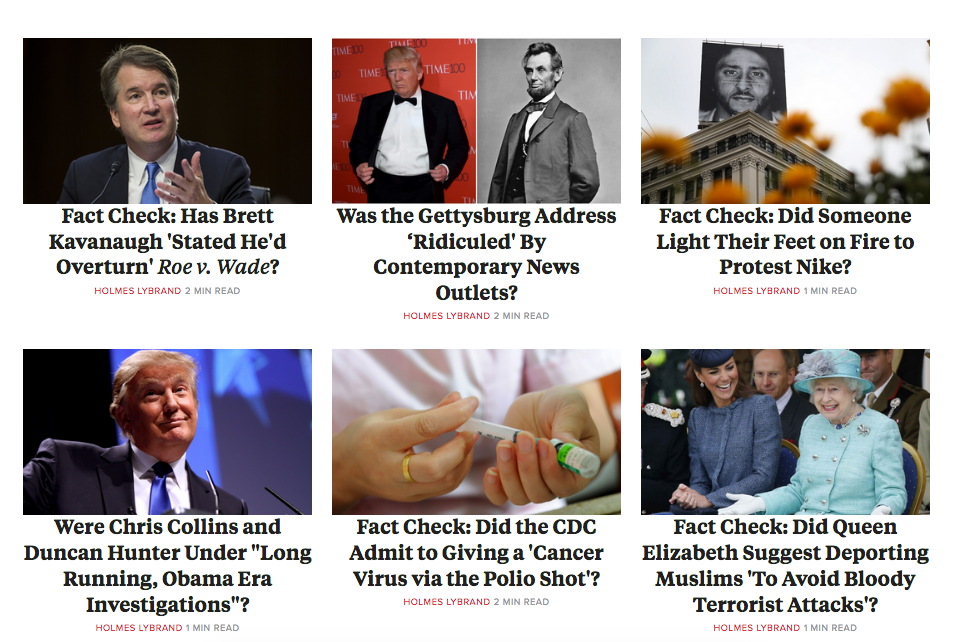Despite its global user base, Facebook’s actions against misinformation keep being informed by and analyzed with a narrowly American viewpoint.
This was evident again on Tuesday, when U.S. progressive news site ThinkProgress argued it was being censored on the social network under the orders of one of its fact-checking partners, The Weekly Standard Fact Check.
(Note: being a verified signatory of the IFCN code of principles is a necessary condition to join the partnership; we’ll return to that toward the end.)
The dispute centered around a headline. In a legal analysis published Sept. 9, ThinkProgress argued that Supreme Court justice nominee Brett Kavanaugh’s testimony and previous speeches heavily implied he would vote to overturn the abortion-rights decision Roe v Wade.
The headline, however, showed no such subtlety, claiming that “Brett Kavanaugh said he would kill Roe v. Wade last week.”

Kavanaugh did not make any variation of that statement. In a fact check published the next day, TWS Fact Check noted that “Arguments surrounding whether Kavanaugh would overturn Roe aside,” the nominee never made that literal claim.
The tension between literalism and contextualism is one fact-checkers face every day, and was well-documented in the book “Deciding What’s True” by journalism professor Lucas Graves. Swing too far towards literalism and you’re a bone-headed bean counter. Get too contextual and you’re taking wild leaps of interpretation — something fact-checking was explicitly set up to avoid.
Donald Trump’s peculiar communication style is extremely well-suited to triggering this inherent limitation of fact-checking. We spent an entire news cycle two years ago discussing Peter Thiel’s argument that journalists were taking him “literally but not seriously,” while his supporters were doing the opposite.
He didn’t actually mean that unemployment was 42 percent, Barack Obama was born in Kenya and climate change was a hoax perpetrated by the Chinese. Wake up, sheeple! Read between the lines!
This interpretative license can be heavily colored by personal biases.
In a message, Graves told me that “we’re very selective in how we use nuance. It’s easy to be forgiving of imprecision in arguments we agree with, to argue that they should be evaluated in context.”
“Meanwhile, we’re usually slavish literalists when it comes to ideas we reject.”
Even Nobel laureates like Paul Krugman have demonstrated this attitude toward fact-checking. In December 2015 he used a non-scientific sample of fact checks published by (Poynter-owned) PolitiFact to imply Republicans lied more. Just a couple of years before that, he ran a blog post with the headline “RIP PolitiFact” because he’d found its fact-checking too literal.

Back to today.
Armed with his fact check, The Weekly Standard’s Holmes Lybrand proceeded to flag the ThinkProgress article on Facebook as false. This reduced its reach and sent a notification to users sharing it about the related fact check. So ThinkProgress went into attack mode, accusing Facebook of censoring it “because (a) conservative site told them to.”
This dispute exposes the fact that Facebook doesn’t really have an answer to a fundamental question: What is its fact-checking for? Is it to clean up the junky viral hoaxes about sharks swimming up interstates? Or to target inaccurate information in all its guises?
Under pressure to address weaponized misinformation (especially, but not exclusively) outside the United States, the social network has defaulted for the latter interpretation.
No respectable fact-checker on this planet would deem ThinkProgress’ article an instance of “fake news.” Yet its headline was misleading. (TWS Fact Check has said it will remove the flag if the headline is corrected.)
With Facebook unable or unwilling to make an editorial judgment over the type of inaccurate information it wants its fact-checking partners to prioritize, the ThinkProgress piece made the cut. My understanding is that Facebook is working to flesh out these guidelines. I believe in the good intentions of the team working on the product (less so those of their superiors), but this is two years too late.
That Facebook’s guidelines need to be clearer doesn’t absolve fact-checkers of their responsibility. Slung from relative isolation to the nevralgic center of a battle for the future of the internet, they need to ensure that their delegated powers over Facebook are used responsibly.
How literal should their fact-checking on Facebook be? What should it primarily target? How can it be effectively appealed? And how can all these rules work across the more than 15 countries the tool is currently active in?
These are all questions fact-checkers and Facebook are asking themselves, but not ones there has been a serious public debate over. This would have been a great moment for heavy-hitting media critics to weigh in. Instead, most abdicated their responsibility, content to let the debate be dominated by narrow interpretations along the lines of “Facebook is catering to conservatives.”
This accusation confuses an anecdote with data. The Weekly Standard’s fact check of ThinkProgress doesn’t prove that it is wielding its Facebook partnership “to drive liberal news outlets into the ground.” If critics have an issue with its fact-checking, they should do so by addressing its corpus of fact checks.

TWS Fact Check cleared the IFCN verification process last year (see the assessment here). The application process is laborious, requiring the evaluation of an external journalism expert and the approval of a board of international fact-checkers. This isn’t Twitter’s blue checkmark we’re talking about.
The idea that a board composed of five non-American fact-checkers with no vested interest in U.S. party politics and two American fact-checkers who have been on the receiving end of pointed barbs by The Weekly Standard’s editorial pages for years somehow gave the organization preferential treatment is absurd.
I don’t want to be disingenuous here. Facebook is happy to point to the IFCN’s impartiality when justifying its choice of fact-checking partners but then wink to conservatives that it’s also leaning on organizations they trust. Mark Zuckerberg did as much in his editorial for The Washington Post last week by only name-dropping the Associated Press and The Weekly Standard as fact-checking partners. Had he wanted to prove the credibility of his actions, why not mention Factcheck.org (the oldest U.S. dedicated fact-checking website) or PolitiFact (the sole Pulitzer Prize winner)?

There is a legitimate discussion to be had about whether fact-checking units of publications with editorial leanings should be allowed to become IFCN verified signatories. But it is not a discussion about The Weekly Standard alone. The IFCN verifies fact-checking projects from all over the world. One of the oldest and most reputable fact-checking projects in the world resides in a French paper that is unabashedly left-leaning.
We look exclusively at the fact-checking unit because we believe that, even if media organizations have diverse editorial positions, they should work by the same rules if they want to publish fact checks. We think common rules about fact-checking might help combat the fragmenting media ecosystem. Clearly, not everyone agrees.
The IFCN tries to keep Facebook accountable, especially when it comes to transparency of the tool (Twitter receipts here, here, here, here, here, here, here, here, here, here and here). It, in turn, needs to be kept accountable.
One year after we launched the verification process (under which TWS Fact Check was assessed) we published a 21-page report on its limitations and tightened some of the criteria. We continue to welcome recommendations and complaints. Our verification process lasts only one year precisely so that fact-checkers must be continuously assessed against a raised bar.
TWS Fact Check’s flagging of a ThinkProgress analysis raises questions about how Facebook should combat misinformation and what makes for a credible fact-checker. Rather than addressing those questions, the prevailing argument on Twitter and media blogs was about which side of the American political spectrum has a greater right to be aggrieved.
That majestically undervalues the problem at hand.
What do you think of the code? Email us at factchecknet@poynter.org or tweet us @factchecknet. You might also want to read these two diametrically opposed Slate takes on the incident by Will Saletan and Mark Joseph Stern.







